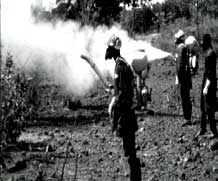No artificial flavours
 researchers at the Long Ashton Agricultural Research Station near Bristol in southwest uk, are combining genetic engineering and largescale field experiments to find ways by which to reduce the use of pesticides, herbicides and fertilisers. Cutting down on the use of such chemicals will help protect the environment and also conserve non-renewable resources. Their research has successfully shown that chemical inputs in agriculture can be greatly reduced without economic penalties in the form of a loss in profits.
researchers at the Long Ashton Agricultural Research Station near Bristol in southwest uk, are combining genetic engineering and largescale field experiments to find ways by which to reduce the use of pesticides, herbicides and fertilisers. Cutting down on the use of such chemicals will help protect the environment and also conserve non-renewable resources. Their research has successfully shown that chemical inputs in agriculture can be greatly reduced without economic penalties in the form of a loss in profits.
The Less Intensive Farming Environmental ( life ) Research Programme being implemented at Long Ashton involves the cultivation of almost all major temperate crops on 25 ha of land. The use of chemicals was reduced by selecting varieties that are resistant to diseases and the rotation of crops. From a more radical point of view, the life research programme may be considered to be a moderate approach to the conservation of the environment. But the reductions in the use of chemicals achieved by the programme during the course of the last five years, have been quite dramatic. According to Vic Jordon, who leads the life research team, "Its (the programme's) aim is to reduce environmental costs and enhance environmental safety of farming in the uk . We are also looking at farming practices to see how they can be manipulated to control pests, diseases and weeds.'
Explaining his team's findings, Jordan argues that the lowering of crop yields has been outmatched by the reduction in the use of chemi-cals. Jordan enunciates the benefits of the programme by listing the following: "Yields are down by 10 per cent, but we have all the same saved over 34 per cent of the cost of growing crops. The reduction in the use of nitrogen fertilisers has been to the tune of 40 per cent. The use of herbicides has been brought down by 26 per cent. The application of insecticides and fungicides has been cut down by 80 per cent. Also, we do not use chemical plant growth regulators anymore.'
Just as the growth of humans and animals is controlled by hormones, so is the case with the growth of plants. Plant hormones known as gibberellins control the growth of stems, leaves, flowers and fruits. Gibberellins are sprayed onto crops to boost their growth. But the use of this chemical is known to have unwanted, harmful effects on plants and animals. Peter Hedden of the Long Ashton Research Station demonstrated that one could do without using such chemicals. "One way is to manipulate the production of gibberellins within the plant by modifying the genes that are responsible for the production of hormones,' explained Hedden.
Hedden had recently isolated the gene for one of the key enzymes (natural chemical catalysts) responsible for producing gibberellins. "We think the level of this enzyme determines the amount of gibberellins actually made,' he said. He had introduced extra copies of the gene into the plants and shown that they could make more gibberellins and grow faster. Hedden also managed to slow plant growth by making and using an artificial gene which happened to be the mirror image of the gene encoding the enzyme producing gibberellins. Genes like this have the effect of blocking the action of genes they are mirror images of, or in other words, they switch off the unwanted genes.
Hedden's antisense gene can slow down the production of gibberellins when it is introduced into the plant. As a result, Hedden has both: he has the means of speeding up as well as slowing down the action of gibberellins, as and when required. Both have been tested and have been shown to work in a weed called Arabidopsis thaliana . Hedden plans to initially use the antisense gene to control the growth of chrysanthemum stems so as to produce shorter and less straggly stems, and then control growth in the wheat plant in the same way, so as to equip it to withstand winds and heavy showers better. The use of the technique on other crops is expected to follow.
"All this is not only relevant to developed countries but also the developing world, where the use of chemicals in agriculture is rather high. We have identified factors that can be manipulated in developing countries towards more sustainable systems that are less reliant on chemical inputs. We have shown that farming can go hand in hand and profitably with environmental protection,' adds Jordan.
